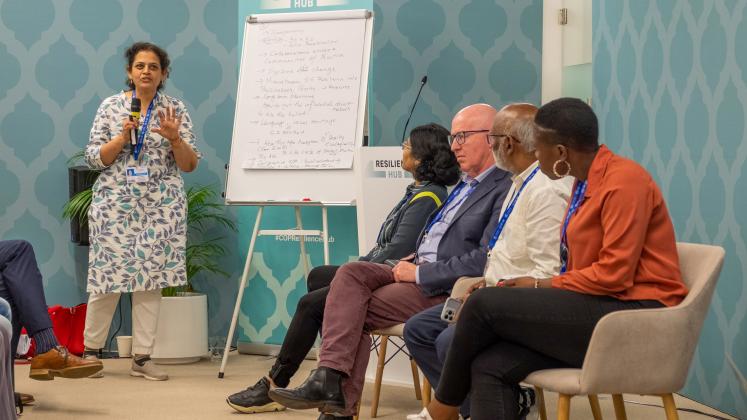On 8 December 2023, UNU-IAS held an event at the 2023 UN Climate Change Conference (UNFCCC COP28) on collaborative action to build and strengthen socio-ecological resilience. The event took place at the Resilience Hub and included an interactive session in which participants shared experiences and brainstormed solutions.
Convening experts from diverse sectors — engineering, business, academia, and indigenous peoples and local communities — the event explored collaborative approaches to socio-ecological resilience, defined as the capacity to adapt or transform in response to unforeseen changes in socio-ecological systems while maintaining human well-being. Discussants proposed cross-sectoral solutions to address the interconnected challenges of climate change and biodiversity loss, stressing the importance of integrating them into business practices and infrastructure development.
The event highlighted the importance of preserving traditional and indigenous knowledge encompassing practices such as sustainable land and water management and biodiversity conservation, which contribute to mitigating the impact of natural disasters and climate change. Noting the role of the loss and damage fund in fortifying resilience, participants agreed that if applied through a human-rights approach, the fund could be a catalyst for building sustainable resilience through strategic investments in infrastructure, energy and transport.
The event was organized by UNU-IAS, UNU Institute on Comparative Regional Integration Studies (UNU-CRIS), UNU Maastricht Economic and Social Research Institute on Innovation and Technology (UNUMERIT), and the International Coalition for Sustainable Infrastructure (ICSI). It was moderated by Suneetha Subramanian (Research Fellow, UNU-IAS), Nidhi Nagabhatla (Senior Research Fellow, UNU-CRIS), Sanae Okamoto (Researcher, UNU-MERIT) and Savina Carluccio (Executive Director, ICSI).




